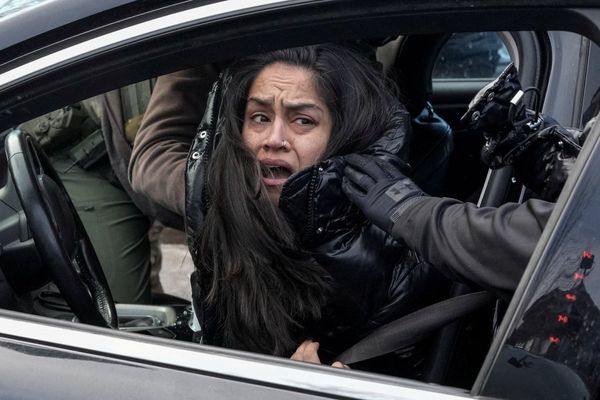
Handcuffed and being hauled into the back of a police van, Tim Crosland still managed to crack a smile after being arrested under the Terrorism Act last month.
“The mother of all democracies, people,” the former government lawyer can be seen saying in now viral footage after he was one of 27 people arrested at the Gandhi statue in Parliament Square for allegedly showing support for a proscribed organisation, Palestine Action.
Five weeks later, Crosland, 55, is once again at the centre of the action before what is expected to be a return to the square on Saturday by hundreds of people risking arrest under anti-terrorism laws. Defend Our Juries, of which he is a co-founder, has asked them to hold up signs saying: “I oppose genocide. I support Palestine Action.”
The moment is also a milestone in a personal “gamekeeper turned poacher” journey that has taken him from being a barrister holding senior positions at the Serious Organised Crime Agency (SOCA) and National Crime Agency (NCA), to being a radical activist using street protest to challenge the will of the state.
“Over time, I came to the conclusion that no, you do not make substantial change from the inside,” Crosland recalls of his time working for government. A large part of his role had been to advise on human rights obligations, but he now believes he was naive about this and there was a substantial gap between the rhetoric of government organisations about rights, and the reality.
“The forces are too strong, too powerful, you can delude yourself that you’re making an impact and then you can look back and see that it’s just gone back to where it was.”
Born in Hammersmith, west London, Crosland attended the prestigious private school St Paul’s, where the future chancellor George Osborne was a year below him.
A vegetarian from a young age, he went on to study classics at Oxford, took a law conversion course and became a barrister.
His legal career before joining government led him to a life-changing experience when he worked in the deep south of the US on death row appeals – the case of a 17-year-old in New Orleans was particularly shocking.
While the work on behalf of those on death row is something he had in common with Keir Starmer, it was not until joining government that he crossed paths with the future prime minister, then a young lawyer. At SOCA, Crosland recalls instructing Starmer to write advice on positive human rights obligations and then on the intersection with the duty of care.
“I remember what he wrote was so bad we had to go to him and ask him to redo it,” adds Crosland, who says Starmer’s initial effort was “flaky” and he had not engaged with the question.
“He did deal with it reasonably gracefully when we said we were expecting a little bit more than that and came back with something much better.”
After leaving government, Crosland became an environmental lawyer, co-founding the campaign group Plan B, which was one of the parties that brought a landmark legal case against Heathrow’s owners over a planned third runway.
In a change of events that would lead to him being disbarred in 2023, he was fined £5,000 in 2021 for criminal contempt of court after deliberately making public a supreme court ruling related to the airport before the result was officially announced.
Since then he has gone from being in trouble with his friends in law, to being in trouble with the law itself. Police are yet to charge him and others who were arrested last month – he believes they are waiting in part to see what happens with a legal challenge of Palestine Action’s proscription.
Either way, opting out of further activism is not an option for Crosland, who talks of “having a duty to intervene”.
“We are talking about deeply peaceful, principled people who are trying to stop atrocities,” he says of what might be his true “tribe”, the climate activists and those campaigning against Israel’s actions in Gaza.
“That is my understanding of non-violent action. It doesn’t mean sitting back quietly in a corner.”







